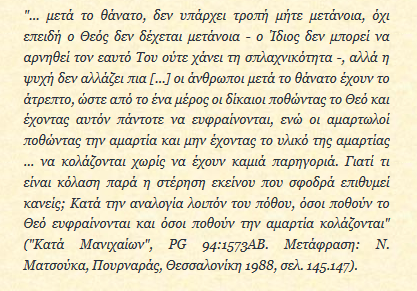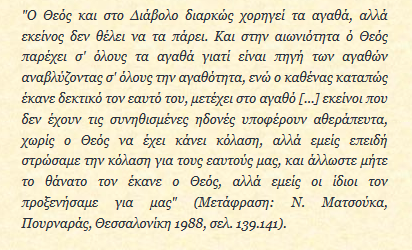by John Sanidopoulos

Below are some very characteristic and very important passages from Saint John of Damascus on the subject of Hell:
1. Hell is not God’s punishment, but it is a state of receptivity. It appears that Hell and Paradise as “places” do not exist. There is only God, who is present in all places (omnipresent).

“And so we know, that God does not punish anyone in the future, but everyone makes themselves receptive to share in God. And so to share in God is a delight, while not sharing in Him is hell.” (“Against the Manicheans”, PG 94:1545D-1548A)

“… after death, there is no means for repentance, not because God does not accept repentance – He cannot deny Himself nor lose His compassion – but the soul does not change anymore … people after death are unchangeable, so that on the one hand the righteous desire God and always have Him to rejoice in, while sinners desire sin though they do not have the material means to sin … they are punished without any consolation. For what is hell but the deprivation of that which is exceedingly desired by someone? Therefore, according to the analogy of desire, whoever desires God rejoices and whoever desires sin is punished.” (“Against the Manicheans”, PG 94:1573??)

“God forever supplies good things even to the devil, but he does not want to receive it.” (“Against the Manicheans”, PG 94:1569B)

“God forever supplies good things even to the devil, but he does not want to receive it. And in eternity God supplies good things to all because He is the source of good things gushing forth goodness to all, while everyone makes themselves receptive, and they share in the good … those who do not have habitual pleasures and suffer without being healed, without God making hell, but because we lay out hell for ourselves, and indeed nor did God make death, but we ourselves caused this for us.”
So we can say that the exact Orthodox doctrine teaches that:
In the Eternal Kingdom there are not separate places, but states of sharing in and being receptive to God. So Hell and Paradise are names of states experienced and not “places”.
In the Eternal Kingdom only God exists, whose light some will experience as Paradise and others as Hell.
Hell and Paradise will be experienced not because God condemns or rewards people, but because they freely chose the state they will be in. Indeed, proof of Hell being a free choice is that God accepts repentance, but there is no expression of repentance for God to accept them because the person “does not want it”.
